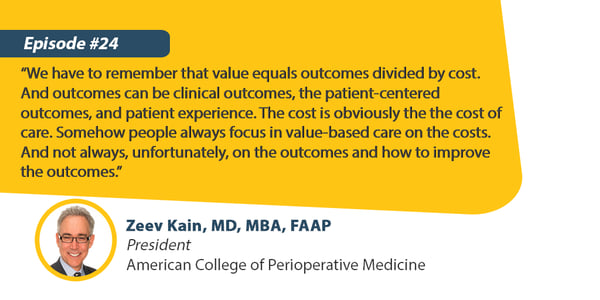Episode Overview:
Innovative care delivery models aren’t limited to only primary care. In this episode of Value-Based Care Insights, Daniel J. Marino and Shaillee J. Chopra talk to Dr. Zeev N. Kain, MD, MBA. Dr. Kain is a Yale- and Harvard-trained physician, a thought leader, and an innovator. He’s internationally well-known for his seminal work on transforming surgical care through value-based care, which is focused on an improved patient and provider experience, improved clinical care, and lowered healthcare costs. During this episode, Dr. Kain shares why pivoting to innovative care models is crucial to reduced costs and increased positive clinical outcomes.
Co-hosts:

Daniel J. Marino, Managing Partner, Lumina Health Partners

Shaillee Chopra, Principal, Lumina Health Partners
Guest:
 Dr. Zeev Kain, MD, MBA, President, American College of Perioperative Medicine
Dr. Zeev Kain, MD, MBA, President, American College of Perioperative Medicine
Episode Discussion Areas:
1. American College of Perioperative Medicine’s (ACOPM’s) approach to innovative models.
- They break the silos between all the health care providers and all the stages of care that organizations deliver.
- They bring more than just physicians and nurses to a conference — about a third of attendees are executives and consultants.
- ACOPM doesn’t focus on only drugs, machines, techniques, or outcomes — they bring it all together.
2. Impact of COVID on value-based care.
- The quality of value-based care depends on which area of the country you reside in.
- Certain practices literally vanished during COVID
3. Focus on all areas within the surgical care model.
- We must remember that value equals outcomes divided by cost.
- Outcomes can be clinical outcomes and patient-centered outcomes, like the patient experience.
- With value-based care, people focus on the costs and not always, unfortunately, on the outcomes and how to improve them.
4. Clinical and financial outcomes experienced
- On the clinical side, we’ve seen reductions in length of stay (LOS).
- We’ve seen increased levels of transitions to home versus to skilled nursing facilities.
- We’ve also seen reductions in readmission rates.
- On the patient experience side, we’ve seen better survey scores in both pain experience and patient experience.

6 Key Takeaways: Delivering Innovative Care Delivery Models in the Surgical Space
1. COVID has exposed many challenges we see in fee-for-service.
When elective procedures decreased, significant financial strain was placed on healthcare organizations. Value-based structures may have minimized those financial impacts. Now organizations are looking at how they position themselves, structure their care delivery models, and engage their resources and provider community – into value-based care.
2. ACOPM is offering cross-delivering care across the continuum.
There’s magic in value-based care and how it improves the performance of your surgical environment as well as teamwork. So we’ve focused on forcing the different areas within that surgical care model to work together.
3. What has been the impact of COVID on value-based care?
COVID has forced a disruption in the entire model. The impact right now varies, based on the part of the country you’re in: value-based care is in California, but not as much in Texas. But COVID could create the burning platform for change — especially knowing how many surgical specialties were impacted by COVID.
4. The advice organizations should keep in mind as they think about their strategic partnerships.
While value equals outcomes divided by cost, outcomes can include clinical and patient-centered outcomes as well as the patient experience. When you focus on just the costs, not the outcomes, you fail to realize that when you improve the outcomes, your value goes up, even if the cost doesn’t go down.
5. Why are clinical guidelines and the perioperative surgical home important?
The 22 clinical guidelines that make up enhanced recovery after surgery (ERAS) have been shown to dramatically reduce length of stay (LOS) and morbidity rates when clinicians adopt all 22 guidelines. The perioperative surgical home looks at the entire episode of care — from 90 days before surgery to 90 days post-surgery — to give us a holistic view from the operational, clinical, financial, and patient-centered models. But it’s not these protocols that are important — it’s the way providers incorporate them into the delivery of care.
6. What are the clinical and financial outcomes arising from the Enhanced Recovery Perioperative Surgical Home program?
- Reduction of length of stay
- Increased levels of transitions to the home versus to skilled nursing facilities
- Reduction in the readmission rate
- Improved patient experience side
- Financially, we’ve saved millions of dollars by reducing costs and leveraging these outcomes in value-based care contracts.
About Value-Based Care Insights Podcast
Value-Based Care Insights is a podcast that explores how to optimize the performance of programs to meet the demands of an increasing value-based care payment environment. Hosted by Daniel J. Marino and Shaillee Chopra, the VBCI podcast highlights recognized experts in the field and within Lumina Health Partners.





Share this: